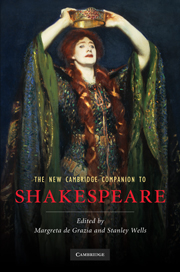Book contents
- Frontmatter
- 1 The traces of Shakespeare’s life
- 2 Shakespeare’s reading
- 3 Shakespeare’s writing: from manuscript to print
- 4 The theatre of Shakespeare’s London
- 5 The transmission of Shakespeare’s texts
- 6 Shakespeare and language
- 7 Shakespeare the poet
- 8 Shakespeare’s comedies
- 9 Shakespeare’s tragedies
- 10 Shakespeare’s English history plays
- 11 Shakespeare’s classical plays
- 12 Shakespeare’s tragicomedies
- 13 Shakespeare, religion and politics
- 14 Shakespeare and race
- 15 Shakespeare, sexuality and gender
- 16 Shakespeare on the stage
- 17 The critical reception of Shakespeare
- 18 Shakespeare and popular culture
- 19 Shakespeare and globalization
- 20 Shakespeare and media history
- 21 Shakespeare: reading on
- Index
18 - Shakespeare and popular culture
Published online by Cambridge University Press: 28 January 2011
- Frontmatter
- 1 The traces of Shakespeare’s life
- 2 Shakespeare’s reading
- 3 Shakespeare’s writing: from manuscript to print
- 4 The theatre of Shakespeare’s London
- 5 The transmission of Shakespeare’s texts
- 6 Shakespeare and language
- 7 Shakespeare the poet
- 8 Shakespeare’s comedies
- 9 Shakespeare’s tragedies
- 10 Shakespeare’s English history plays
- 11 Shakespeare’s classical plays
- 12 Shakespeare’s tragicomedies
- 13 Shakespeare, religion and politics
- 14 Shakespeare and race
- 15 Shakespeare, sexuality and gender
- 16 Shakespeare on the stage
- 17 The critical reception of Shakespeare
- 18 Shakespeare and popular culture
- 19 Shakespeare and globalization
- 20 Shakespeare and media history
- 21 Shakespeare: reading on
- Index
Summary
Shakespeare? Popular culture?
What sense does it make to couple Shakespeare - Bard of Avon, icon of genius, highbrow extraordinaire - with 'popular culture'? If his writings are widely valued for their complexity, timelessness and universal human truths, popular culture is for many synonymous with banality, the ephemeral and the trivial. If Shakespeare is deep and difficult, the typical products of popular culture are shallow and all too accessible. To enjoy Shakespeare, the argument might run, requires training, time and long-term investment; the consumption of popular culture, by definition, requires little or no effort. From the perspective of these stark contrasts, 'Shakespeare and popular culture' looks like a dead-end of incompatibility.
Yet Shakespeare is everywhere in contemporary culture. His presence is not confined to the 'official' locations of classrooms, universities and theatres, but permeates popular mass media such as cinema, television, tabloid journalism, computer games, pop music, comics and advertisements. Shakespeare's face sells products and is familiar to millions, many of whom may never have read or seen his work; any bald-headed, bearded man need only don a ruff and grab a quill to be instantly recognizable as 'Shakespeare'. Someone this easily impersonated is a major celebrity. Shakespeare’s words are quoted and misquoted (intentionally or otherwise) to amuse, persuade and impress. Many of Shakespeare’s characters have been plucked from their plays to become freestanding cultural stereotypes of amorousness (Romeo), indecision (Hamlet) or steely ‘un-feminine’ ambition (Lady Macbeth). Shakespeare’s plots are plundered to provide storylines for films, science fiction and soap operas. Shakespeare scholars have increasingly sought to analyse and theorize what Douglas Lanier has called ‘Shakespop’, the presence, citation and appropriation of Shakespeare across a range of popular mass media.
- Type
- Chapter
- Information
- The New Cambridge Companion to Shakespeare , pp. 269 - 284Publisher: Cambridge University PressPrint publication year: 2010
- 1
- Cited by

